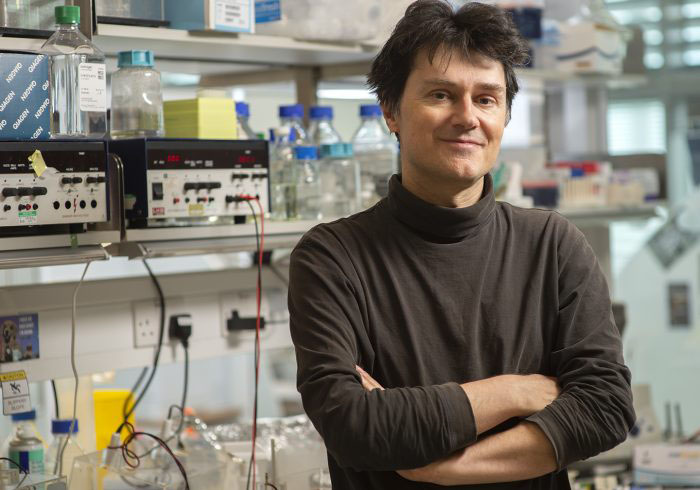
Group Leader Phil Holliger joins Jason Chin as Joint Head of Division of the LMB’s Protein and Nucleic Acid Chemistry (PNAC) Division. Together, they will oversee the Division’s core research into biological processes which underpin immunity and cancer, and spearhead the Division’s expanding research in the field of synthetic biology. Phil takes over the position from Andrew McKenzie, who has helped lead the Division since 2013.
Phil started his research group at the LMB in 2005, where he focuses on the fields of chemical biology, synthetic biology and in vitro evolution. In particular, his group seeks to better understand the fundamental systems of heredity, whereby DNA and RNA ensure genetic information storage and propagation. They explore the synthesis, replication and evolution of entirely synthetic nucleic acids, known as xeno nucleic acids (XNAs). Furthermore, his group have also sought to identify novel, divergent properties of these XNAs, which offer potential for biomedical or pharmaceutical applications.
To this end, Phil’s group have developed a new directed evolution technique to improve reverse transcriptase activity for any nucleic acid chemistry, and identified a polymerase enzyme to speed up the costly process of synthesizing XNAs. More recently, he and group member Ben Porebski have worked with AstraZeneca Biologics Engineering group to create a new, ultra-high-throughput method to enable rapid discovery of high-affinity antibodies to clinically relevant drugs.
Phil graduated from the Swiss Federal Institute of Technology (ETH), Zürich, Switzerland with distinction working with Steven A. Benner. Moving to Cambridge, he completed a Ph.D. and then a postdoc working with Greg Winter in the MRC Centre for Protein Engineering, before transferring to the LMB with Greg in 1998. Phil was elected a member of EMBO in 2015 and has served as a consultant to several biotechnology companies, including AstraZeneca, Illumina and GSK. His technique using in vitro compartmentalization to direct evolution of enzymes has licensed several times and continues to attract commercial interest for a variety of applications.
The PNAC Division
The PNAC Division was created in 1962 as the LMB moved to its new building on the Addenbrooke’s campus and officially adopted the name MRC Laboratory of Molecular Biology. The Division, initially just called Protein Chemistry until 1965, welcomed Fred Sanger and his group from the Biochemistry Department at the University of Cambridge, where he began his Nobel Prize-winning work on nucleic acids. Today, the Division’s research covers several topics, including the immune system, chemical origins of biology and the mechanisms behind core cellular functions. In 2012, a new chemistry-orientated Centre for Chemical and Synthetic Biology (CCSB), was established, to help support the Division’s expanding work in synthetic biology and strengthen its chemical expertise.
Further references
Phil’s group page
Protein and Nucleic Acid Chemistry Division
Scientific Leadership at the LMB